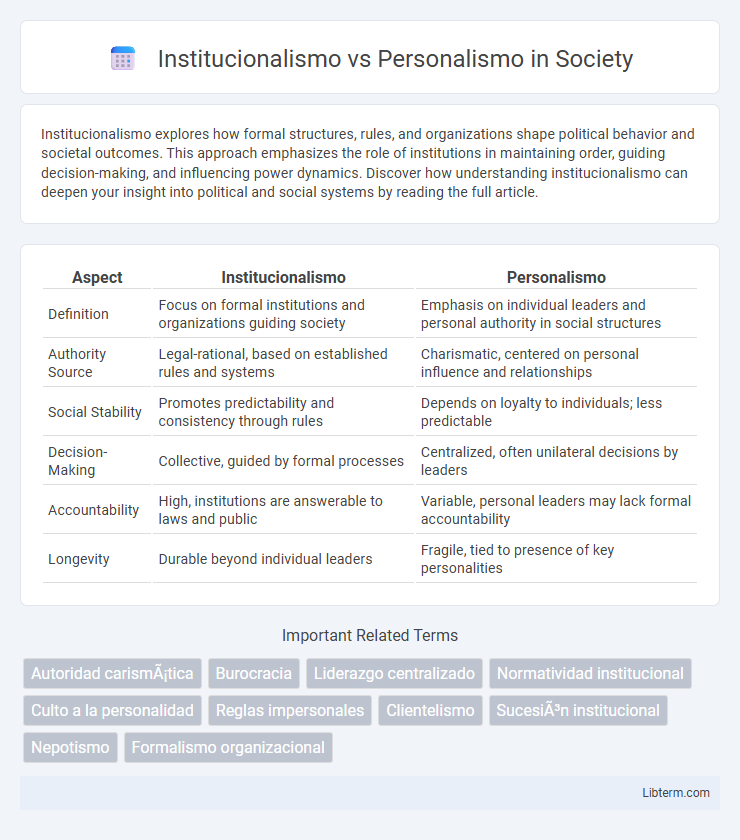Institucionalismo explores how formal structures, rules, and organizations shape political behavior and societal outcomes. This approach emphasizes the role of institutions in maintaining order, guiding decision-making, and influencing power dynamics. Discover how understanding institucionalismo can deepen your insight into political and social systems by reading the full article.
Table of Comparison
| Aspect | Institucionalismo | Personalismo |
|---|---|---|
| Definition | Focus on formal institutions and organizations guiding society | Emphasis on individual leaders and personal authority in social structures |
| Authority Source | Legal-rational, based on established rules and systems | Charismatic, centered on personal influence and relationships |
| Social Stability | Promotes predictability and consistency through rules | Depends on loyalty to individuals; less predictable |
| Decision-Making | Collective, guided by formal processes | Centralized, often unilateral decisions by leaders |
| Accountability | High, institutions are answerable to laws and public | Variable, personal leaders may lack formal accountability |
| Longevity | Durable beyond individual leaders | Fragile, tied to presence of key personalities |
Introducción al Debate: Institucionalismo vs Personalismo
Institucionalismo emphasizes the importance of formal structures and established rules in shaping political behavior and decision-making processes, highlighting how institutions create stability and predictability. Personalismo prioritizes individual leaders and their personal influence, charisma, and authority as central to political dynamics, often leading to power centralization. The debate centers on whether political outcomes are primarily driven by enduring institutions or by dominant personalities within those systems.
Definición de Institucionalismo
Institucionalismo se define como una corriente de pensamiento politico y social que enfatiza la importancia de las instituciones formales y las reglas estructuradas en la organizacion y funcionamiento de la sociedad y el Estado. Esta perspectiva sostiene que las instituciones sociales, politicas y economicas moldean el comportamiento individual y colectivo, promoviendo la estabilidad y la continuidad en los sistemas de gobierno. El institucionalismo contrasta con el personalismo al centrar su analisis en estructuras y normas en lugar de en la voluntad o el carisma de un lider especifico.
¿Qué es el Personalismo en Política?
Personalismo en politica se refiere a un estilo de liderazgo donde la autoridad y el poder se concentran en la figura de un lider carismatico, mas que en instituciones o normas establecidas. Este enfoque enfatiza la lealtad personal sobre las estructuras formales, promoviendo la toma de decisiones centralizada y la dependencia del lider. En contraste con el institucionalismo, el personalismo puede debilitar la estabilidad politica al subordinar las reglas y procedimientos a la voluntad individual del lider.
Orígenes Históricos de Ambos Enfoques
Institucionalismo emerged during the late 19th and early 20th centuries, emphasizing the role of established political and social institutions in shaping governance and public policy. Personalismo has roots in Latin American political history, arising as a response to weak institutional frameworks and highlighting the influence of charismatic leaders and personal authority. Both approaches reflect contrasting historical developments: institucionalismo prioritizes formal rules and structures, while personalismo centers on individual leadership and authority dynamics.
Características Clave del Institucionalismo
Institucionalismo emphasizes the importance of established structures, formal rules, and enduring organizations in shaping political and social behavior. It focuses on the role of institutions in providing stability, continuity, and predictability within governance systems. Key characteristics include the prioritization of legal frameworks, collective decision-making processes, and the constraint of individual actors by institutional norms.
Rasgos Fundamentales del Personalismo
Personalismo emphasizes the central role of individual leaders in shaping political power, characterized by strong personal loyalty and charismatic authority. It often undermines formal institutions by prioritizing personal relationships and informal networks over legal-rational structures. The fundamental traits include concentration of power in one person, lack of institutional accountability, and reliance on patronage systems.
Ventajas y Desventajas: Comparación Directa
Institucionalismo emphasizes rule-based governance, ensuring consistency and stability, while personalismo relies on individual leadership, which can drive swift decision-making but risks authoritarianism. Ventajas del institucionalismo incluyen mayor transparencia y responsabilidad, pero puede generar burocracia excesiva; personalismo ofrece flexibilidad y rapidez, aunque puede resultar en falta de rendicion de cuentas y dependencia del lider. La comparacion directa revela que institucionalismo fortalece sistemas a largo plazo, mientras personalismo puede ser efectivo en contextos de crisis o cambios rapidos.
Impacto en la Gobernanza y Democracia
Institucionalismo emphasizes the role of structured institutions in ensuring consistent governance and protecting democratic principles by promoting rule-based decision-making and accountability. Personalismo centers power around individual leaders, often undermining institutional checks and balances, which can lead to authoritarian tendencies and weaken democratic processes. The impact on governance is profound, as institucionalismo fosters stability and transparency, while personalismo risks governance volatility and democratic erosion.
Casos de Estudio en América Latina
Casos de estudio en America Latina revelan el contraste entre institucionalismo y personalismo como modelos politicos predominantes; el institucionalismo se caracteriza por la fortaleza y continuidad de las instituciones democraticas, mientras que el personalismo se centra en lideres carismaticos con control centralizado. Paises como Chile y Costa Rica ejemplifican tradiciones institucionalistas con sistemas electorales estables y respeto al Estado de derecho, en contraste con Venezuela y Nicaragua, donde el personalismo ha generado concentracion de poder y debilitamiento institucional. La comparacion demuestra como estos enfoques impactan la gobernabilidad, la estabilidad politica y la calidad democratica en la region latinoamericana.
Reflexiones Finales y Perspectivas Futuras
Institucionalismo emphasizes the role of formal structures and established norms in shaping political behavior, while Personalismo prioritizes individual leadership and charisma as key determinants of political outcomes. Reflexiones finales highlight the need to balance institutional frameworks with personal influence to ensure stable governance and democratic resilience. Future perspectives suggest integrating technological advancements and participatory mechanisms to strengthen institutional accountability and mitigate excessive reliance on personalismo.
Institucionalismo Infographic

 libterm.com
libterm.com